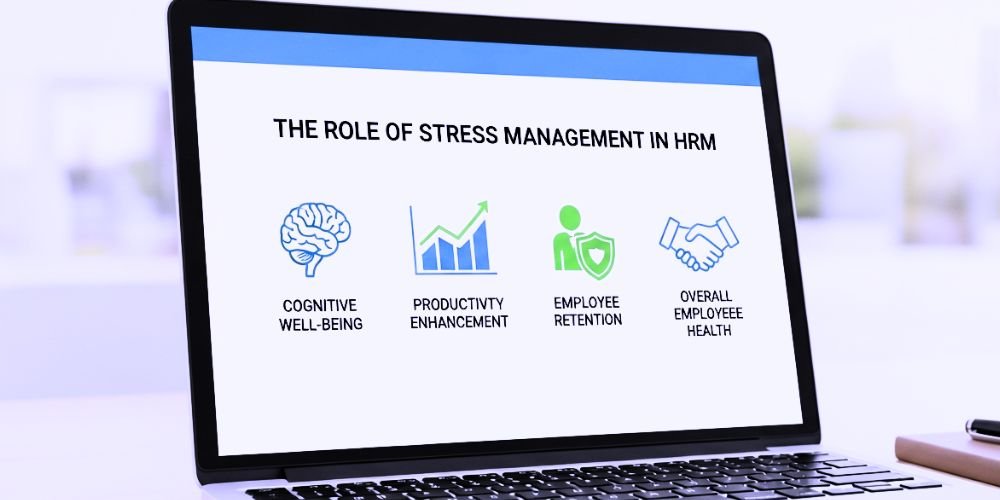In today’s fast-paced and demanding work environment, stress has become a prevalent concern affecting employee well-being and organizational performance. Effective stress management is essential for maintaining a healthy and productive workforce. This article explores the significance of stress management in HRM, the impact of stress on employees and organizations, and best practices for fostering a supportive and resilient work culture.
Understanding Stress Management in HRM
Stress management in HRM involves creating a work environment that effectively supports employees in managing and coping with work-related stress. It encompasses a range of strategies, policies, and programs aimed at reducing stress levels, enhancing employee well-being, and promoting resilience. HRM professionals collaborate with management and employees to identify stressors, implement preventive measures, and provide resources for stress management. Human Resource Management (HRM) is crucial in implementing strategies and initiatives that promote organizational stress management and resilience.
The Impact of Stress Management on HRM
Effective stress management is an essential aspect of human resource management. Companies can improve productivity, reduce absenteeism, and enhance overall job satisfaction by providing employees with the necessary tools and resources to manage their stress.
Employee Well-being and Health
Prolonged exposure to high levels of stress can have detrimental effects on employees’ mental and physical health. Stress-related conditions such as anxiety, depression, burnout, and cardiovascular diseases can decrease productivity, absenteeism, and healthcare costs. Managing stress effectively is crucial for preserving employees’ well-being and maintaining a healthy workforce.
Job Performance and Productivity
Stress Management in HRM can significantly impact job performance and productivity. When employees are overwhelmed by stress, their ability to concentrate, make decisions, and solve problems can be compromised. High-stress levels can impair creativity, motivation, and job satisfaction, decreasing productivity and suboptimal performance.
Employee Engagement and Retention
Stressful work environments can negatively impact employee engagement and retention. Employees experiencing chronic stress may become disengaged, leading to a reduced commitment to the organization and increased turnover rates. Creating a supportive work culture that prioritizes stress management contributes to higher employee engagement, satisfaction, and retention.
Best Practices for Stress Management in HRM
Regarding stress management in HRM, implementing best practices is key to promoting employee wellness and business success.
Identify and Address Stressors
HRM professionals collaborate with employees and management to identify stressors within the workplace. It can include excessive workload, unrealistic deadlines, poor work-life balance, lack of resources or support, and organizational changes. Understanding the specific stressors allows HRM to develop targeted interventions and implement preventive measures.
Promote Work-Life Balance
Encouraging work-life balance is crucial for stress management. Stress Management in HRM can implement policies and practices that support flexible work arrangements, such as remote work, flexible schedules, and wellness programs. Organizations can reduce stress levels and enhance employee well-being by promoting a healthy balance between work and personal life.
Enhance Communication and Support Systems
Effective communication is essential for stress management. Stress Management in HRM can foster open and transparent communication channels, ensuring employees feel comfortable expressing their concerns and seeking support. Establishing employee assistance programs, counseling services, and confidential channels for reporting stress-related issues can provide additional support to employees.
Provide Training and Development
Stress Management in HRM is critical in providing training and development programs that enhance employees’ stress management skills. Workshops or seminars on resilience, time management, mindfulness, and stress reduction techniques can empower employees with tools to manage stress effectively. By equipping employees with these skills, organizations promote a resilient workforce.
Foster a Positive Work Culture
Creating a positive work culture is important for stress management. HRM can promote a supportive and inclusive work environment that values work-life balance, recognizes employee achievements, and encourages teamwork and collaboration. Organizations create a foundation for stress management and resilience by fostering a culture that prioritizes employee well-being.
Regular Evaluation and Feedback
Stress Management in HRM should regularly assess the effectiveness of stress management initiatives and gather employee feedback. Surveys, focus groups, and performance evaluations can provide valuable insights into the impact of stress management strategies. This feedback enables HRM to make data-driven decisions, refine interventions, and improve stress management practices continuously.
Conclusion
Stress management in HRM is crucial for fostering employee well-being, enhancing organizational performance, and cultivating resilience within the workforce. Stress Management in HRM professionals can effectively manage and reduce workplace stress by identifying stressors, promoting work-life balance, improving communication and support systems, providing training and development, fostering a positive work culture, and conducting regular evaluations.
Prioritizing stress management leads to increased employee engagement, improved job performance, reduced turnover rates, and a healthier work environment. Organizations can create a thriving workforce that contributes to long-term success by nurturing resilience and supporting employees in effectively managing stress.













